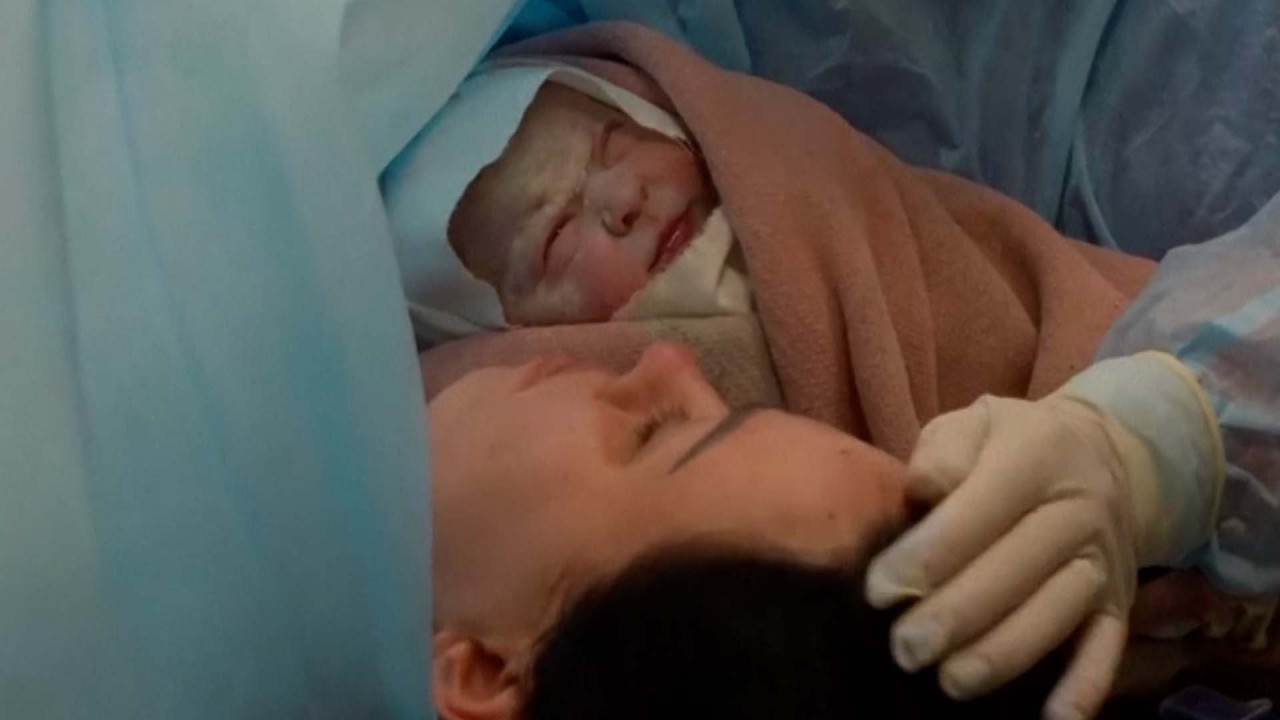
Ukraine war: The children suffering as bombs drop on schools, nurseries and hospitals
- At least 103 children have died in the conflict, Ukrainian officials said, and while many have fled the country, millions have stayed
- Children face an ‘immediate and growing threat’ from Russia’s invasion of Ukraine, said the UN Children’s Fund UNICEF
Fourteen-year-old Anna-Maria Romanchuk’s lip trembles after a Russian missile exploded outside Gymnasia No34 Lybid, her school in Kyiv. “Scary,” Anna-Maria says in halting English, her face pale with shock as her mother Oksana comforts her. “I just hope that everything will be OK.”
A body lies under a sheet, near a huge crater where the blast ripped through a square between the school, a nursery and several Soviet-era blocks of flats.
The force of the blast blew out every single one of the windows in the school, known as one of the best in the Ukrainian capital’s northwestern Podilsky district.

Locals say the school was being used as a bomb shelter for civilians, and cannot understand how it could be a target for Russian President Vladimir Putin’s forces.
“Our principal wrote us and asked us to come and help clean up the glass,” says Tetiana Tereshchenko, 41, as she sweeps up with a broom.
Her daughter, who is also 14, is crying, she says. “We were hoping we would go back to school. We had distance learning, now we do not know.”
Kyiv’s mayor Vitali Klitschko said one person was killed in Friday’s attack and 19 injured, including four children.
Children face an “immediate and growing threat” from Russia’s invasion of Ukraine, the UN Children’s Fund UNICEF says.
At least 103 children have died, including four in Kyiv, Ukrainian officials said. At least six secondary schools and four primary schools in the capital have been damaged.
Many have fled the country, with some 90 per cent of the 3.2 million refugees from Ukraine being women and children. Yet there are millions of children who have stayed.
The situation in Kyiv is not as dire as in pummelled cities like Mariupol and Kharkiv, but children in the capital are still at risk from the strikes that now hit the city daily.
“This is senseless nonsense,” raged former world heavyweight boxing champion Wladimir Klitschko, the mayor’s brother, as he visited the scene. “Is this a military base here? Is this infrastructure? This is a living district. A kindergarten has been destroyed.”
Ringed by tight security, the towering Klitschko strides into the housing estate to meet people whose houses have been wrecked. The explosion tore off the end of one block, exposing flats with beds, chairs and shelves inside, like a child’s doll’s house.
Smashed chunks of concrete cover a playground and the square is now a wasteland of singed trees and mangled cars.
“A warrior should fight a warrior, not civilians. Most of all I care that little children and women are being killed,” said Roman Vasylenko, 53, whose door and window were blown out.
He shows off a certificate saying he was one of the “liquidators” who cleaned up the Chernobyl nuclear plant after the 1986 disaster, and pictures of his daughter and grandchildren, who have since fled to Romania.

Glimpses of children’s pre-war life can be seen through the empty window frames of Gymnasia No34 Lybid: an alphabet poster, wall decorations and blackboards. Dozens of local volunteers help take smashed glass and window frames to a huge pile of debris, hoping that one day the school can rebuild and reopen.
The whoosh of outgoing rocket fire however is a reminder that the school is only a few kilometres from the frontline with Russian forces trying to encircle Kyiv.
For Ukrainians, the war remains as senseless as ever. “My grandad is Russian. I’m Ukrainian. I don’t understand the aim. Why so many people die, why?” said Inna, 33, whose windows were also smashed.
“There is somebody killed from that house. Why? In the school, children find shelter. Why do our children have to suffer? What did they see here in the school?”
The fear of a Russian assault on the capital has so far emptied the city of around half of its 3.5 million inhabitants, including many children. Tetiana Tereshchenko, pushing her glasses up her nose as she carries on sweeping, says she will not be among them. “Where would we go? This is our city. We do not want to leave it.”

.png?itok=arIb17P0)
